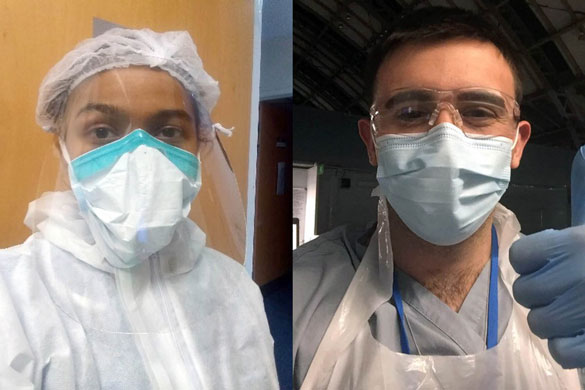
Two University of Liverpool students have been combining their studies with helping patients through the worst of coronavirus at Liverpool’s care homes and Manchester’s Nightingale Hospital.
The students, who are both Royal Naval Cadets, are volunteering on the front-line to support NHS and care home staff in the fight against COVID-19.
Monika Pura Kalleshappa, from Bangalore in India, came to Liverpool to study Advanced Aerospace Engineering, where she also signed on for the local University Royal Naval Unit known affectionately as the URNU.
Unable to return to her family in India due to the pandemic, Monika decided to play an active role in the UK, volunteering to help in care homes despite the risks due to the high rate of infection.
“I felt it was the right opportunity to serve the country even though I knew many vulnerable people in care homes had already tested positive for COVID-19 and were dying, I didn’t want to be just sitting at home so I volunteered.”
“I have seen so many people infected – the people we care for and the carers have all been contracting the illness. I’ve experienced people showing symptoms and passing away within a week. I have found it particularly heart-breaking losing people who I have grown so close to; people who I have taken care of, listened to their stories and experienced their kindness.”
Ciaran Finn, who also serves with Liverpool’s University Royal Naval Unit, has worked at the temporary Nightingale Hospital in Manchester that has been set up specifically to deal with the pandemic in the North West.
He is now juggling his degree in Business Studies with Spanish and Portuguese, with providing life-saving care in the 750-bed facility established in Manchester’s G-MEX centre.
Ciaran had been working as a carer in a nursing home, where he saw the effects of the virus, and put his name forward to work at the new NHS facility. He spends all his working day in PPE, assisting with medical procedures and recording observations, as well as supporting and helping patients – many seriously ill.
“I got on well with one elderly patient, who unfortunately died. It was upsetting, but the fact that his family couldn’t come and visit him was heart-breaking. We all comforted him as much as we could during his death, which I hope helped his family to know that he didn’t die alone and was surrounded by people who enjoyed his company and admired him.”
University Royal Naval Unit (URNU)
There are 15 URNUs located across the UK offering opportunities to 750 undergraduates from the country’s leading universities.
The URNU provides you with the chance to experience military life without commitment. In short, it is a chance to meet like-minded people who may even become your friends for life.
You will be given the chance of deployment on Royal Navy Warships, where you will participate in naval exercises designed to develop your Communication, Leadership, and Management Skills, and get paid for the pleasure.
To find out more visit the URNU website.